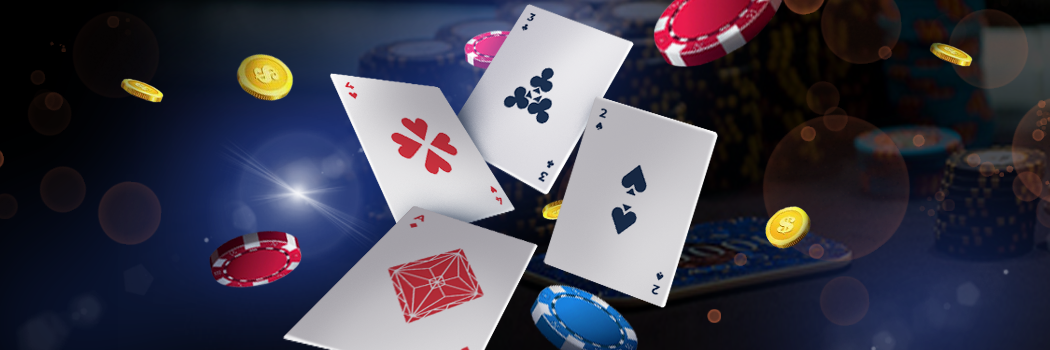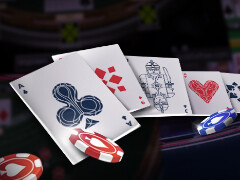How to Play Badugi Poker

The discipline Badugi poker is a relatively new card game that came to us from Asia, and to be precise – from South Korea. This variety, let's say, is not the most popular on the market, but it can offer non-standard gameplay, which captivates fans of the exotic formats.
The popularity of the game increased in 2008 when the world's largest online room PokerStars added it to its list of offers. This option will serve as an ideal entertainment during a home poker party, because it's full of action.
Many people are not even aware of the existence of such a poker type, but we will fix the situation. In the article you will find detailed Badugi rules, as well as some basic tips for choosing starting cards.
Badugi Poker: a Brief Overview
It combines the characteristics of draw poker and lowball, and therefore is very similar to 2-7 triple draw. However, the hand ranking system here differs from other variations with the exchange, as well as the number of pocket cards – there are 4 of them (dealt blindly). A full deck of 52 cards is used (from 2 to A), without jokers.
Your goal is to take the pot by collecting the weakest combination in the hierarchy, and these are necessarily cards of different suits without pairs. Or you can get the pot by forcing all opponents to fold their hand in the betting process.

Translated from Korean, “badugi” means “rainbow”. It reflects the key aspect of the game, that is, the variety of cards.
Each participant is given the chance to change the composition of the starting hand in order to collect the best combination of cards. There are 3 exchange rounds in total, each followed by a betting round for a total of 4 rounds of betting.
Options for action:
- call;
- bet;
- raise;
- reraise;
- skipping a move (check);
- fold.
During draws (exchanges), it is allowed to get rid of 1 to 4 cards at the discretion of the player, or leave the hand unchanged. This option is called "stand".
Bet Structure
The action in the Badugi game is usually played in a fixed-limit format. During the first two rounds of betting, a small bet is used, and in the third and fourth rounds a big bet is used. For example, at a table with a $1/$2 limit, at first you can bet only $1, and then $2.
There are also options with no limit and pot limit), but they are less popular.
Game Process
The hand begins in the same way as when playing Texas Holdem, PLO and Draw poker – the blinds are paid. Participants in positions to the left of the button put down small blind and big blind. Then everyone is dealt four pocket cards.
If you know the rules of Badugi poker, then you will like this easy and exciting format. Here you need to bet a lot and defend your right to the pot. Let’s consider all the stages of the game step by step:
- First bet
The player to the left of the BB starts the betting round and the next decision is made clockwise. Participants have three options to choose from (fold, call or raise).
- First exchange
The players who are left in the hand may discard any number of their hole cards (from 1 to 4). They get the same number of new elements from the deck in return.

It is not necessary to exchange cards if you are satisfied with the starter set (this also applies to the other two rounds). During the exchange, the person sitting to the left of the button position is the first to make a decision.
- Second bet
The next round of betting comes, and it goes according to the already familiar scenario. If one participant manages to knock out all his opponents from the fight, he takes the bank and the game ends.
- Second exchange
Everyone can again exchange any number of their pocket cards, or leave them unchanged.
- Third bet
Another chance to try to knock out opponents from the hand. You can bet, check, call, raise or fold.
- Third (and final) exchange
This is the last opportunity to discard unwanted cards and improve your hand. The replacement algorithm is similar to the previous rounds.
- Fourth bet round
Active players check, bet, call or raise, and fold one last time. If there are two or more people left in the hand, then a showdown occurs. According to Badugi rules, the best low hand wins the pot.
Everyone who has not folded up to this point demonstrates the collected combinations and compares them. For example, a hand of 8♠-5♦-3♣-2♥ beats 9♣-6♥-3♦-2♠. Also, do not forget that an ace in this variety refers to the lowest rank, it is used as a “1”.
Hand Combinations in Badugi
In Badugi hand rankings, the combinations are different from the traditional sets of cards used in Holdem or Omaha poker. The most remarkable thing is that aces are considered exclusively low cards, and the presence of pairs or flushes work against you. However, there are no straights in the game, so four cards in ascending order will not harm you in any way.
Here it is possible to collect the following hands:
| Combo | Description | Example |
|---|---|---|
| 4-card or “Badugi” | This is the strongest one in this game. It is a combination of cards of different suits (rainbow hand) in different denominations, where the best set is from ace to 4. | A♣-2♥-3♦-4♠ (nuts) K♣-Q♦♠-J♥-10♠ (the worst possible badugi hand) |
| 3-card | Three cards of different suits or unpaired. If several players have collected the same combinations, then the fourth one can play the role of a kicker. | A♦-3♠-5♣-5♥ |
| 2-card | A set of two cards of different suits. Since the example on the right has two suited elements and a pair of threes, only A (ace) and one four are counted. | A♠-2♦-4♣-4♦ |
| 1-card hand | Worst possible hand. When you have a four of a kind or all elements of the same suit, then only one of them counts. | K♠-K♣-K♦-K♥ A♥-2♥-3♥-4♥ |
Basic Strategy for Beginners
Choosing the right starting cards to play is a key element of success. Let’s see what combinations are considered to be Badugi best hands from each position:
- Early position – open raise with good 4-card combinations, as well as with 3-card combinations up to six.
- Medium position – enter the game with 3-card hands up to seven and 4-card hands up to jack.
- Late position – freely raise with good and average 3-card hands up to a nine.
- Small Blind – open even with average 3-card sets. If someone has already raised, you should significantly narrow your range.
- Big Blind – use strong 2-card and medium-strength 3-card hands to defend against late position raises. If players in the early/middle position have raised, use a narrower range.
The Badugi poker format is relatively young, but it can be an interesting one to try. Especially for poker players who are already bored with two-card Holdem and want to learn something exotic and non-standard.
#Ad 18+ Full T&C apply. BeGambleAware. First time depositors only. Min deposit $10. Select 'Match Bonus' in cashier. Max bonus $600. Bonus released in $1 increment per $5 paid in net rake/tournament fees. 90 days after eligible first deposit to unlock full bonus. Withdrawal restrictions apply.
#Ad 18+ Full T&C apply. BeGambleAware.org. First time depositors only. Min. deposit £10 with code 'STARS400'. Play on any real money table on the site within 120 days after making eligible deposit. Bonus released in £5 instalments every 100 redemption points. No withdrawal during bonus period. Please play responsibly.
#Ad 18+ Full T&C apply. BeGambleAware. UK first depositors only. Min. deposit: $10. Bonus will be granted as tournament tickets gradually over 6 days and will expire after 24 hours. Full T&C apply
FAQ
💡 What is Badugi explained?
Badugi is the name of a special kind of poker, which is considered to be a fairly new and not very popular format. This is a type of game with card exchanges where you need to collect the lowest possible hand according to special rules. Combinations and the course of the game are described in more detail in our material.
🎯 What's the best hand in Badugi?
The best hand in this discipline is the Badugi hand. These are four cards from ace to four, and always of different suits. So an example would be A♣-2♥-3♦-4♠.
💎 Is Badugi ace high or low?
In the Badugi poker game, there is a special rule regarding the ace card – it is always considered the lowest possible card. That is, an ace is equal to “one”.









Please, login or register.